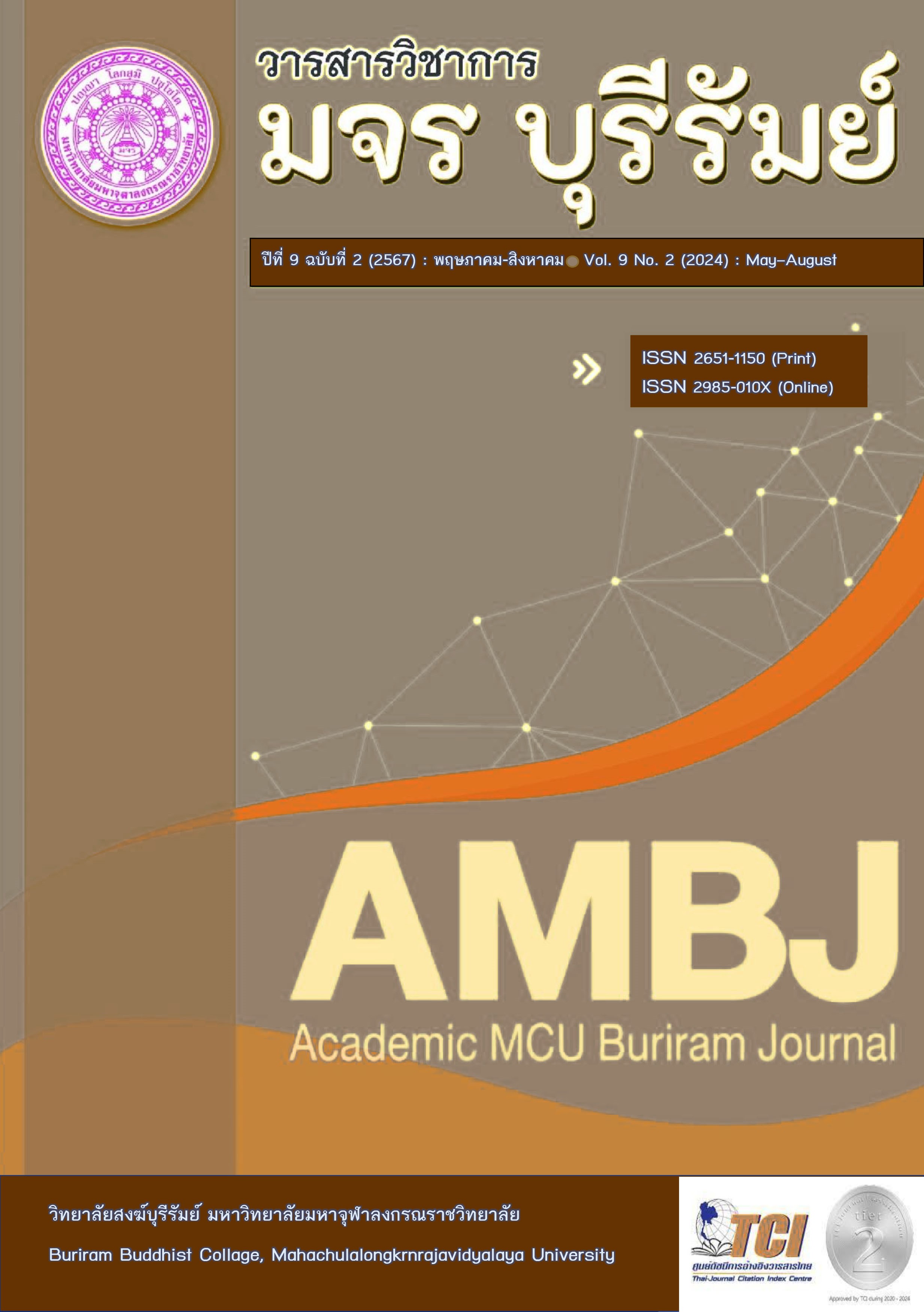Technological Leadership of Educational Institution Administrators at Thung Tako Witthaya School Under the Surat Thani Secondary Educational Service Area Office, Chumphon
Keywords:
Technological Leadership, Educational Institution Administrators, Thung Tako Witthaya SchoolAbstract
The purposes of this research were: 1) to study the level of technological leadership of educational institution administrators at Thungtagowittaya School. Under the jurisdiction of the Secondary Educational Service Area Office, Surat Thani, Chumphon, and 2) to presenting guidelines for developing technological leadership of educational institution administrators at Thung Tako Witthaya School. Under the Surat Thani Chumphon Secondary Educational Service Area Office for the academic year 2023, the sample group includes 1) 4 educational institution administrators, 2) 55 teachers, and 3) 7 educational personnel, totaling 66 people. Number of informants. Importantly, the number of 5 people was obtained through purposive selection. The research instrument was a questionnaire. and interview form Statistics used in quantitative data analysis include frequency, percentage, mean, and standard deviation. For qualitative data, content analysis was used.
The research results found that:
1. Technological leadership level of educational institution administrators at ThungTako Witthaya School Under the jurisdiction of the Surat Thani Secondary Educational Service Area Office, Chumphon, with an overview of technological leadership of educational institution administrators. at a high level When considering each aspect, it was found that there was 1 aspect with the highest level and 4 with the highest level.
2. Guidelines for developing technological leadership of educational institution administrators at Thung Tako Witthaya School Under the jurisdiction of the Surat Thani Secondary Educational Service Area Office, Chumphon, there are 5 aspects arranged from highest to lowest as follows: 1) Vision in using technology is at the highest level 2) learning management at a high level 3) Organizational management is at a high level 4) Ethics in using technology is at a high level 5) measurement and evaluation at a high level It was found that the technological leadership of the administrators of Thung Tako Witthaya School It is at the highest level in 1 aspect and the other 4 aspects are at the high level. In order to develop and improve according to each area that has recommended guidelines, causing the school to develop according to all 5 areas, resulting in development in a better direction.
References
จิณณวัตร ปะโคทัง. (2561). ภาวะผู้นำยุคดิจิทัลสำหรับผู้บริหารสถานศึกษามืออาชีพ. วิทยานิพนธ์ศึกษาศาสตรมหาบัณฑิต สาขาวิชาบริหารการศึกษา. บัณฑิตวิทยาลัย: มหาวิทยาลัยราชภัฏอุบลราชธานี.
จุฬาลักษณ์ อักษรณรงค์ และกุหลาบ ปุริสาร. (2561). ปัจจัยที่ส่งผลต่อภาวะผู้นำเชิงเทคโนโลยีสารสนเทศของผู้บริหารสถานศึกษา สหวิทยาเขตหนองหานสังกัดสำนักงานเขตพื้นที่การศึกษามัธยมศึกษา เขต 20 จังหวัดอุดรธานี. วารสารบัณฑิตเอเชีย, 8(2), 178-188.
ชัญญาภัค ใยดี. (2560). การศึกษาแนวทางการพัฒนาภาวะผู้นำเชิงเทคโนโลยีของผู้บริหารสถานศึกษา สังกัดองค์การบริหารส่วนจังหวัดนครราชสีมา. วารสารดุษฎีบัณฑิตทางสังคมศาสตร์, 8(1), 150-163.
ธีรโชติ หล่ายโท้. (2560). การศึกษาความสัมพันธ์ระหว่างภาวะผู้นำเชิงเทคโนโลยีและทักษะด้านการเรียนรู้และนวัตกรรมของผู้บริหารสถานศึกษา สังกัดสำนักงานเขตพื้นที่การศึกษาประถมศึกษาอุตรดิตถ์ เขต 2. วิทยานิพนธ์การศึกษามหาบัณฑิต สาขาวิชาการบริหารการศึกษา. บัณฑิตวิทยาลัย: มหาวิทยาลัยนเรศวร.
ธนกฤต พราหมน์นก. (2560). รูปแบบภาวะผู้นำเชิงเทคโนโลยีของผู้บริหารโรงเรียนมัธยมศึกษา สังกัดสำนักงานคณะกรรมการการศึกษาขั้นพื้นฐาน กระทรวงศึกษาธิการ. ดุษฎีนิพนธ์ปรัชญาดุษฎีบัณฑิต สาขาวิชาการบริหารการศึกษา. บัณฑิตวิทยาลัย: มหาวิทยาลัยบูรพา.
นิคม นาคอ้าย. (2549). ภาวะผู้นำเชิงจริยธรรม แนวคิดในโลกตะวันตก. วารสารบริหารการศึกษา มศว., 4(8), 62-70.
บุญชม ศรีสะอาด. (2545). การวิจัยเบื้องต้น. พิมพครั้งที่ 7. กรุงเทพมหานคร: สุวีริยาสาสน์.
พัชรภรณ์ สุนทรวิบูลย์. (2561). นวัตกรรมการสื่อสารกับอุตสาหกรรมการท่องเที่ยวยุคประเทศไทย 4.0. วารสารวิชาการนวัตกรรมสื่อสารสังคม, 6(2), 200-210.
รัตนาภรณ์ วัชรอัตยาพล. (2563). ตัวบ่งชี้ภาวะผู้นำทางเทคโนโลยีของผู้บริหารสถานศึกษาในสังกัด กรุงเทพมหานคร. ดุษฎีนิพนธ์ศึกษาศาสตรดุษฎีบัณฑิต การบริหารการศึกษา. บัณฑิตวิทยาลัย: มหาวิทยาลัยมหามกุฏราชวิทยาลัย.
สมเกียรติ ตั้งกิจวานิชย์และคณะ. (2556). ข้อเสนอเพื่อการปฏิรูปการศึกษาขั้นพื้นฐานเพื่อสร้างความ รับผิดชอบ (accountability). เข้าถึงได้จาก http://tdri.or.th/ priorityresearch/educational-reform-accountability (สืบค้นเมื่อ 10 มีนาคม 2556).
สุนันทา สมใจ และวิชุดา กิจธรธรรม. (2561). การบริหารสถานศึกษาด้วยภาวะผู้นำทางเทคโนโลยี. วารสารวิทยาลัยดุสิตธานี, 12(1), 350-363.
สุเทพ พงศ์ศรีวัฒน์. (2545). ภาวะผู้นำ ทฤษฎีและปฏิบัติ. กรุงเทพมหานคร: บุ๊คลิ๊งค์.
CASTLE. (2009). Principal Technology Leadership Assessment. Retrieved from http://schooltechleadership.org/wordpress/wpcon tent/uploads/2010/02/ptlainfo_packet.pdf (Accessed November 27, 2023).
Krejcie, R. V., & Morgan, D. W. (1970). Determining sample size for research activities. Educational and Psychological Measurement, 30(3), 607–610.
Downloads
Published
How to Cite
Issue
Section
License
Copyright (c) 2024 Academic MCU Buriram Journal

This work is licensed under a Creative Commons Attribution-NonCommercial-NoDerivatives 4.0 International License.
ทัศนะและความคิดเห็นที่ปรากฏในบทความวารสารฉบับนี้ถือเป็นความรับผิดชอบของผู้เขียนบทความนั้น ไม่ถือเป็นทัศนะและความรับผิดชอบของบรรณาธิการ





